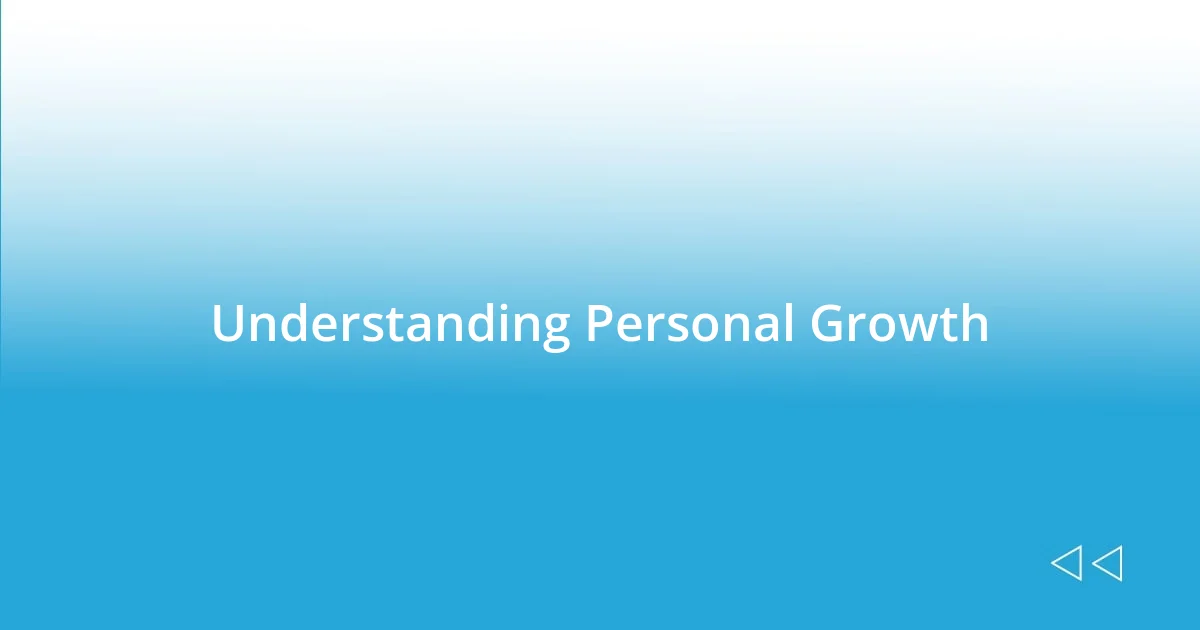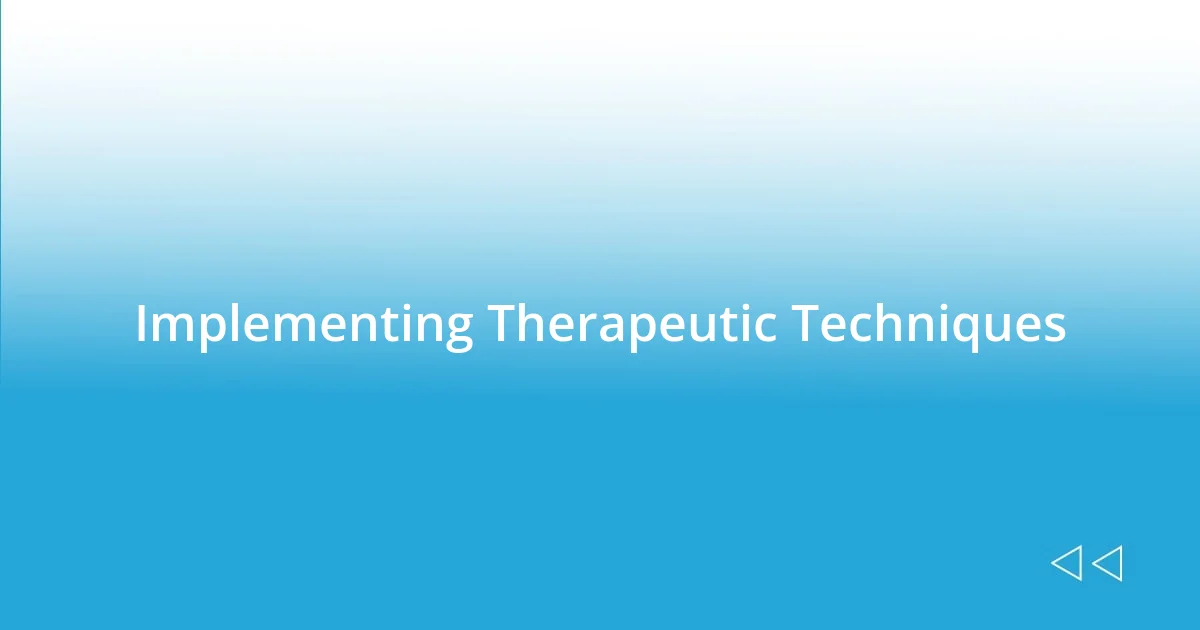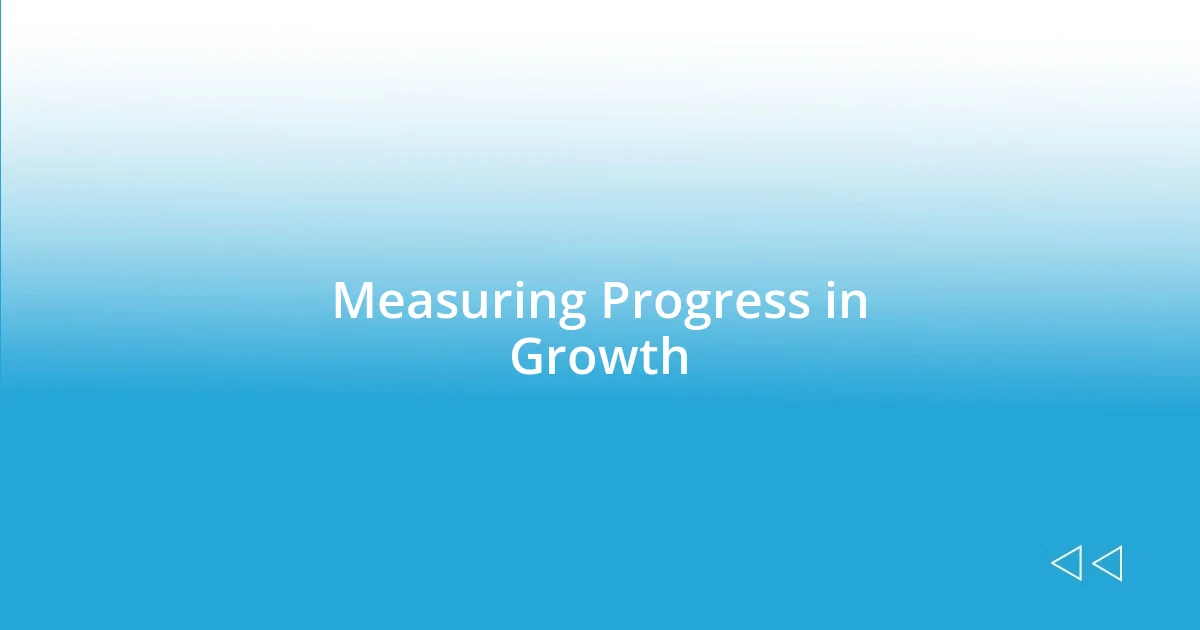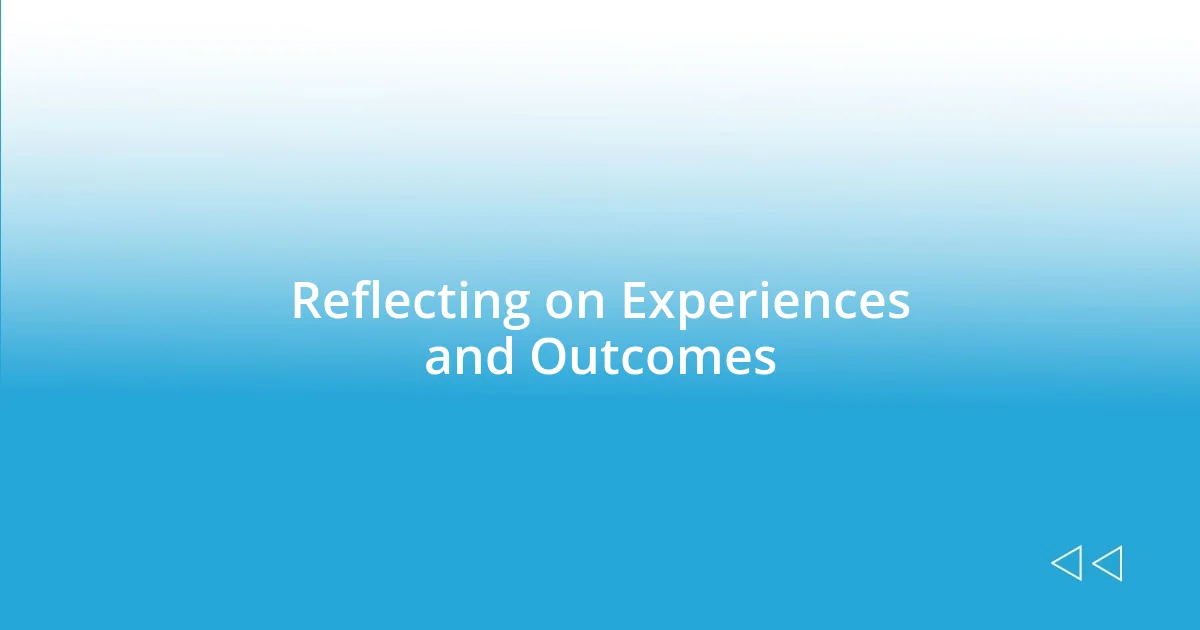Key takeaways:
- Personal growth involves self-awareness and reflection, often achieved through therapeutic practices like journaling and mindfulness.
- Confronting fears and embracing vulnerability can strengthen connections and lead to meaningful personal revelations.
- Measuring progress in growth includes recognizing emotional shifts and celebrating small wins rather than solely focusing on tangible goals.

Understanding Personal Growth
Personal growth is more than just achieving goals; it’s about evolving into a more self-aware version of ourselves. I remember a time when I hit a wall in my personal and professional life. It felt like I was stuck in quicksand—no matter how hard I tried, I couldn’t move forward. It was through therapeutic practices that I learned to pause, reflect, and truly understand what was holding me back.
Often, we think of growth solely in terms of visible achievements, but what about the growth that happens in silence? There were days when I felt overwhelmed by my emotions, and it was through journaling that I uncovered layers of feelings I didn’t even know existed. Writing became my safe space, where I could process fears and hopes without judgment. Have you ever had a moment of clarity after sorting through your thoughts? Those insights can be transformative.
Personal growth also involves confronting our fears and insecurities. A pivotal moment for me was when I decided to address my struggle with vulnerability. It was terrifying to open up, but during therapy, I realized that my boldness in being vulnerable actually strengthened my connections with others. Isn’t it fascinating how facing our deepest fears can lead to profound personal revelations? Through these experiences, I’ve come to see personal growth as an ongoing journey, one filled with challenges and beautiful discoveries along the way.

Importance of Therapeutic Practices
Therapeutic practices are essential tools for unlocking deeper emotional understanding. I remember attending a mindfulness workshop, where I was guided through breathing exercises that seemed so simple—yet they held a profound impact. It was like removing the fog from my mind, allowing me to see my thoughts more clearly. Have you ever felt that calm wash over you during a moment of stillness? That clarity can truly reshape how we view our challenges.
Engaging with therapeutic methods also cultivates self-compassion. One of my most enlightening moments came when I started practicing self-affirmations. I used to be my harshest critic, but through this practice, I began to notice a positive shift. Instead of focusing on my shortcomings, I learned to appreciate my strengths. This transition not only improved my self-esteem but also influenced how I interacted with others. What if you took a moment each day to acknowledge something you love about yourself?
Moreover, therapeutic practices foster resilience, which is pivotal in navigating life’s ups and downs. I vividly recall a particularly challenging period when I felt as though everything was going wrong. Through therapy, I developed coping strategies that equipped me to respond rather than react. This newfound resilience has been invaluable, transforming moments of stress into opportunities for growth. Wouldn’t you agree that having such tools at our disposal is life-changing?
| Aspect | Importance |
|---|---|
| Emotional Clarity | Enhances understanding of thoughts and feelings. |
| Self-Compassion | Fosters a positive self-image and improved confidence. |
| Resilience | Equips individuals with coping strategies for challenges. |

Types of Therapeutic Practices
Therapeutic practices come in various forms, each offering unique pathways to personal growth. I remember trying art therapy for the first time; it was liberating to express my emotions through colors instead of words. This medium allowed me to channel feelings I struggled to articulate, and the experience was both cathartic and enlightening. It’s incredible to think how different therapeutic approaches can resonate with each of us.
Here are some common types of therapeutic practices that people find beneficial:
- Cognitive Behavioral Therapy (CBT): Focuses on changing negative thought patterns to improve emotional responses.
- Mindfulness Meditation: Encourages living in the present moment, helping reduce anxiety and enhance self-awareness.
- Art Therapy: Utilizes creative processes to explore feelings and ideas that might be difficult to express verbally.
- Journaling: Serves as a reflective practice to track emotions and personal growth over time.
- Group Therapy: Provides a supportive community environment where individuals can share experiences and learn from one another.
What strikes me is how therapeutic practices often overlap, enhancing each other to create a rich tapestry of growth. I once attended a group session where members shared their journaling experiences. Hearing how others navigated their challenges illuminated my own journey, highlighting the importance of connection in healing processes. It’s this blend of methods that truly amplifies our personal development.

Identifying Personal Growth Goals
When it comes to identifying personal growth goals, I find that reflection is key. A few years ago, I sat down with a cup of tea and a journal, trying to pinpoint what I truly wanted from life. I asked myself, “What areas do I feel stuck in?” This simple act of questioning opened doors to desires I hadn’t even acknowledged, like wanting to cultivate more meaningful relationships. Have you ever realized that a small shift in perspective can reveal so much about your aspirations?
Creating specific and measurable goals can significantly enhance our growth journey. For instance, instead of saying, “I want to be healthier,” I now focus on tangible steps, like “I will exercise for 30 minutes, three times a week.” This clarity not only provides motivation but also allows me to track my progress, making the journey feel achievable. How often do we make vague resolutions, only to lose sight of them in the haze of daily life?
Additionally, I’ve learned that sharing my goals with others brings accountability and encouragement. I remember confiding in a close friend about my desire to improve my writing skills. She not only checked in with me regularly but also offered constructive feedback on my work. Their support helped me stay committed, turning what started as a vague intent into a tangible reality. Have you thought about who in your circle could support you on your path to growth? This kind of connection can be a game-changer.

Implementing Therapeutic Techniques
Implementing therapeutic techniques can sometimes feel overwhelming, but I’ve learned that beginning with small, consistent steps can make a huge difference. For example, I started incorporating mindfulness meditation into my daily routine by dedicating just five minutes a day to focus on my breath. At first, it felt challenging to quiet my mind, yet over time, those moments of stillness transformed into a sanctuary that helped me tackle my anxiety head-on. Have you found a moment in stillness during your busy day?
Art therapy has also been an integral part of my healing journey. Initially, I was hesitant, thinking I wasn’t “artsy enough” to engage in such a practice. But once I picked up a brush and let my emotions spill onto the canvas, something magical happened. I vividly remember painting a chaotic swirl of colors after a tough week; it was a release that words failed to capture. Each stroke felt empowering, allowing me to explore my inner landscape in a way that was utterly freeing. Isn’t it amazing how our expressions can speak louder than words?
Lastly, I’ve discovered that journaling is not merely writing; it’s a space where I can confront my thoughts and feelings without judgment. I often set aside Sunday evenings to reflect on the week, and honestly, it’s therapeutic. During these quiet moments, I’ve confronted fears I didn’t know were bubbling beneath the surface. When was the last time you truly reflected on your feelings? Each entry becomes a chapter in my personal growth story, crafting a roadmap of progress that I can look back on and celebrate.

Measuring Progress in Growth
Measuring progress in personal growth is both an art and a science, and it often requires looking beyond superficial changes. I remember a time when I thought progress was measured only by outcomes, like achieving a specific goal. But what I’ve come to realize is that the journey itself—moments of realization, emotional shifts, and even setbacks—play a crucial role. Have you ever found that your most profound insights came during unexpected times?
Reflection tools have been incredibly helpful for me. I started using a growth journal, where I not only track my goals but also note down my emotions and thoughts on my journey. One particular entry stands out: I had written about feeling paralyzed by fear before a major presentation. Looking back, I could see how acknowledging that fear was a significant step, revealing my underlying desire to connect with others. Have you ever taken a moment to reflect on how you felt at different points in your journey?
Additionally, I’ve learned to celebrate small wins, which can often go unnoticed amidst the larger narrative of growth. For instance, after months of working on my time management, I found myself consistently prioritizing tasks. Rather than dismissing this shift, I treated myself to a small celebration—a quiet dinner at my favorite restaurant. It was a simple gesture that reminded me to appreciate the progress, no matter how incremental. How do you acknowledge your achievements, no matter how small? These moments of recognition can fuel our motivation and provide a clearer picture of our growth journey.

Reflecting on Experiences and Outcomes
Reflecting on my experiences in therapeutic practices has unveiled layers of understanding that I hadn’t anticipated. For instance, during a particularly poignant therapy session, I found myself tracing the timeline of my emotions across the past year. It was like flipping through a photo album of my inner self—each memory revealing a facet of my growth. Have you ever gone back through your memories to uncover how far you’ve journeyed?
Through reflection, I’ve also learned the importance of patience with myself. There was a time when I expected immediate results from my therapeutic efforts, but I soon discovered that deeper insights often take time to surface. I remember grappling with a persistent negative thought pattern. As I wrote about it in my journal, I began noticing shifts in my perception, like tiny lights flickering in a dark room. Doesn’t it feel empowering to recognize that sometimes understanding ourselves is a gradual journey rather than a race?
The outcome of this reflective practice is profound; it has allowed me to celebrate not just achievements, but shifts in mindset as well. Last month, I realized that my initial frustration with vulnerability had transformed into a sense of strength and courage. When I choose to share my struggles with friends, I often feel a lightness, as if a weight has been lifted. Have you experienced a moment where sharing your vulnerability led to unexpected connections? It’s these realizations that keep me motivated on my path, reminding me that every moment of reflection carries the potential for growth.
















